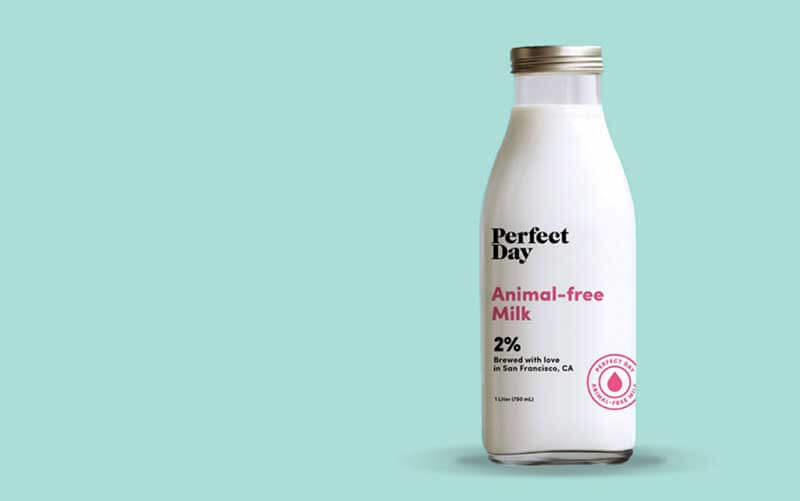- Perfect Day: gene sequencing starts the process of ‘brewing’ dairy
- A cheese lover’s dream come true?
- Perfect Day’s B2B business model will go national on day one
Dairy farming isn’t good for the environment, and a closer look at how it works might leave you a little less willing to take a bite of Gouda or Edam or order that delicious slice of pizza. But it’s important to realise that everyday behaviour has a global impact, and as you’ll soon see, that morning yoghurt is not quite as innocent as it seems.
Because of their size and energy requirements, cows use a lot of resources, about 50 per cent more than a pig. That’s a lot of water and land, much of which is further compromised by their waste, or the fertiliser necessary to keep pastures green and corn rich enough to provide high-quality feed. And cows release a lot of methane, a greenhouse gas that has a far greater impact, gram for gram, than CO2 on global temperatures. In fact, livestock accounts for 14 per cent of global greenhouse emissions, a far higher number than you might imagine. Worse still, the ethics of dairy farming are a sore spot. Milk production isn’t magic: it demands constantly pregnant cows. They’re inseminated as often as necessary, and their offspring are mercilessly sorted. Males are sold for veal; females enter the milk cycle. These issues may make you take a second look at your ice cream, and it’s a little harder to enjoy when you count its actual costs.
And as people become more aware of those, they’re demanding change. Whether worried about the environmental impact or the ethics of commercial dairy, many are reaching for a better option in grocery stores. In fact, the success of plant-based ‘milk’ made from soy, almonds, or rice, now displacing about 10 per cent of dairy sales, suggests there’s a consumer demand for alternatives. But cutting-edge biotech may soon enable guilt-free dairy that’s safe for the environment.
Perfect Day: gene sequencing starts the process of ‘brewing’ dairy
Perfect Day, a startup driven by the inventive genius of Ryan Pandya and Perumal Gandhi, wants to use high-tech gene sequencing to produce dairy proteins in a revolutionary new process. Pandya and Gandhi start by taking DNA from a cow and sharing its protein-producing qualities with ordinary food-grade yeast. The result is a new strain of the basic microbe behind bread and beer, but with a milky twist: when fed the right nutrients, it can now produce whey and casein, the building blocks of dairy-like milk, yoghurt, and cheese. “We’re taking plant nutrients and transforming them into animals [sic] proteins the same way that cows do, using the same milk proteins as found in cow’s milk, but much more efficiently, because we’re using a yeast cell not a 2,000lb animal,” Pandya told the Guardian.

If that doesn’t sound revolutionary, consider that these proteins come without the hormones, steroids, or antibiotics of modern dairy. What’s more, this process is environmentally friendly. For instance, according to Forbes, brewed milk produces 84 per cent less greenhouse gases, and requires 98 per cent less water, 91 per cent less land, and 65 per cent less energy than regular milk. Best yet, this isn’t ‘Franken-milk’ – it’s the real thing, chemically identical to the animal-produced equivalents, but without the environmental damage and cruelty. People who’ve tasted it swear that it’s just like what you’re used to.
A cheese lover’s dream come true?
Pandya and Gandhi know that the love of cheese runs deep – they feel it too! And like pretty much everyone who’s tried them, they came away unimpressed with plant-based substitutes. As Pandya says, “The alternatives for yoghurt, cheese and ice-cream are so bad that people don’t even want to try them … Many have been switching to more plant-based diets but when you have to give up cheese you think ‘oh my god my life sucks I love pizza’. If you try to make cheese out of pea milk you will be sorely disappointed.” With Perfect Day’s dairy proteins, companies can still make cheese, yoghurt, and ice cream the old-fashioned way, but it’ll be better for us, better for the planet, and better for the cows, too. Perfect Day may just save pizza for ethical vegetarians.
Perfect Day’s B2B business model will go national on day one
This isn’t a promise for the future, either. Pandya and Gandhi are savvy businessmen, and they recognised that producing a consumer-ready product like milk or cheese is a huge undertaking. Instead, they’ve set their sights on the long-term, and their plan is to provide the raw ingredients for better-established food companies. This B2B model is a safer place to start. As Gandhi explains, “Nobody else was working on the supply chain side … We started this company to have the largest possible impact on the effects of animal agriculture on our planet, and now we can do that by working with grocery stores across multiple channels. We can be national from Day One.”
The idea, then, isn’t for Perfect Day to begin by producing a line of milk or cheese. Instead, they’ll work with the established players, supplying the raw ingredients for their already popular products. As Chase Purdy reports for Quartz, “These ingredients, such as lactose, casein, and whey, [will be] sold to food manufacturers who use them in countless products across the modern grocery store. They’re in yogurts and cheeses, chocolate spreads and potato chips, even some canned tunas and hamburger buns.” Pandya and Gandhi are now talking with major food companies to see if they can be the source of these dairy ingredients, and that could mean that your yoghurt and cheese could soon be animal-free!
Share via:


